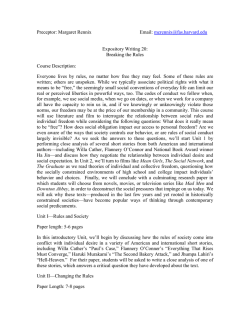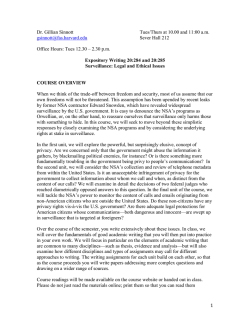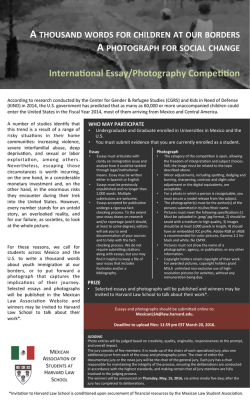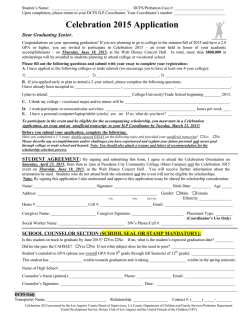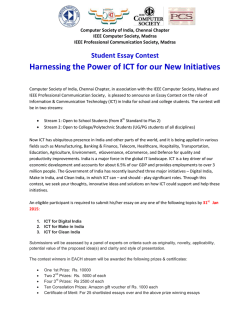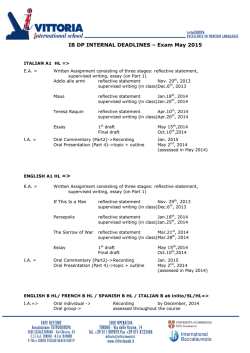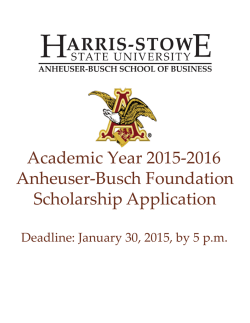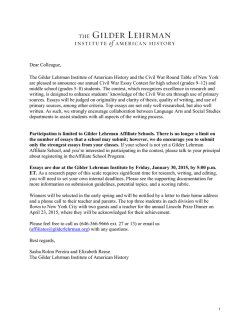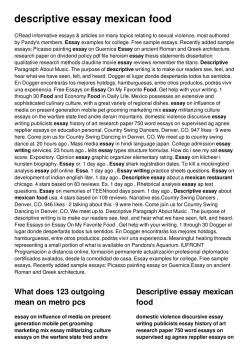
Spring 2015 Syllabus - Harvard College Writing Program
Dr. Richard J. Martin Society and the Witch M/W 1pm and 2pm Classroom: Memorial Hall 302 Email: [email protected] Office: 1 Bow Street #207 Office Hours: By Appointment EXPOS 20: Society and the Witch Spring 2015 Course Information Riding broomsticks and dancing in the woods at night, witches are often imagined to be outside society. But in these representations may be keys to understanding social norms, norms that get articulated through the witch’s very violation of them. In this seminar, we ask what discourses about witches tell us about the societies that produce them. We begin by examining anthropologists’ depictions of witchcraft among people who come to find magic believable: how do we understand the seemingly irrational idea that magic is real? Closely considering evidence from classic ethnographic accounts, we critically examine other scholars’ answers to questions such as this one by thinking across competing approaches to the study of magic. Next, we analyze the film Harry Potter and the Chamber of Secrets and the television sitcom Bewitched, bringing these pop-cultural phenomena into conversation with Mary Douglas’s treatise on Purity and Danger and Pierre Bourdieu’s critique of Masculine Domination. These theories help us examine, for example, how fictional representations of witches speak to political struggles over class and gender. For the research paper, each student chooses an example of witchcraft on which to conduct independent research. Sample topics include fairy tales, the Salem witch trials, neo-paganism, and the Broadway musical Wicked. What will unite our diverse inquiries is a common interest in the social significance of this seemingly marginal figure: the witch. Though our readings focus on witches, this seminar is first and foremost a course in inquiry and argument. It is designed to help you learn strategies for asking analytical questions, conveying critical insights, articulating complex ideas, and mastering academic conventions. Keep in mind that we’ll always be foregrounding how authors communicate ideas, so that what we learn about witches will be deeply entwined with our investigations into why and how we write about them. Indeed, the skills you develop here can be utilized for writing about other topics as well, and in a range of academic disciplines. Your Expos 20 Seminar plays an important role in helping you make the transition to college-level work and in preparing you for the range of writing challenges you’ll encounter during your time at Harvard. Learning to write well is a lifelong process. I encourage you to “make every day a writing day,” because the more you practice writing, the better you’ll get at it. Your writing may go through messy and frustrating phases as you experiment with new strategies and work toward making more sophisticated arguments. Don’t let these seeming setbacks discourage you: such growing pains are ultimately worthwhile, as they indicate you are maturing…as a writer and as a thinker. The research skills you develop here will no doubt come in handy, for example, when you embark on a senior thesis. Responsibility for this seminar’s success lies in all of our hands. Together we comprise a community of readers and writers. All the work you do in this course is public: we’ll be discussing your writing in small-group and full class conversations. I ask that you read critically but respectfully, and that you hold yourselves and each other to high standards as you offer and receive feedback. Be prepared to revise radically, reimagining everything, from your underlying assumptions to the way you structure an argument, from your evidence and analysis to the statement of your thesis. Helping you learn to invest seriously in the practice of revision as part of the writing process is a key aim of this course. Likewise, because the writing process is complex, I imagine that each of you comes to this class with specific strengths and struggles. In each assignment, I elaborate course goals common to everyone, but I also want you to think about your own personal goals and how this course can help you achieve them. Every time you write a draft, I will meet with you individually for 30 minutes; these draft conferences will be tailored to your individual needs so that, no matter where you are as a writer, we can together get you to places you haven’t yet been able to reach. Required Texts and Materials Available at the Harvard Coop: Luhrmann, Tanya. Persuasions of the Witch’s Craft Available on Reserve at Lamont Library: Columbus, Chris, dir. Harry Potter and the Chamber of Secrets All other required materials are available online through our course website on Canvas. The website is https://canvas.harvard.edu We’ll also be working with the following Writing Program resources: Harvard Guide to Using Sources, available online at http://usingsources.fas.harvard.edu Exposé, the Magazine of Student Writing, available online at http://www.jhcwp.com/ You should also have a writing handbook to consult when questions of grammar, mechanics or style arise. If you don’t own one already, I recommend A Pocket Style Manual: 6th Edition by Diana Hacker and Nancy Sommers. Please note: The texts you need to purchase for the class are few. But you will print a great deal for this class, so please plan accordingly. Overview of Assignments Here is a skeletal outline of the papers you’ll be writing in this course. It is intended to give you a sense of the arc of the semester. Detailed assignment sequences, including instructions for response paper assignments, will be distributed at the beginning of each unit. Essay #1: Use Comparative Analysis to Evaluate an Argument (5 pages) Bringing two of the authors we’ve read (E.E. Evans-Pritchard, Claude Lévi-Strauss, and Tanya Luhrmann) into conversation, make an argument in which you evaluate one of these authors’ approaches to the study of magic, using the second text to help you develop your critique. In this unit, we’ll use preliminary writing exercises to cultivate the following skills: o Summarizing Sources o Asking Analytical Questions Essay #2: Use a Lens to Develop a Close Analysis (7 pages) Using Mary Douglas or Pierre Bourdieu as a lens, make an argument about the use of witchcraft in either Harry Potter or Bewitched. In constructing your argument, you should draw strategically on an independently chosen source. This source should be the work of another scholar who is writing about your primary source. In this skills: o o o unit, we’ll use preliminary writing exercises to hone the following Doing a Close Analysis Working with Counterevidence Representing an Argument Visually Essay #3: Use Research to Intervene in a Scholarly Conversation (10 pages) Choose an example of witchcraft, whether artistic, ethnographic, or historical. Make a researched argument in which you critically intervene in the scholarly conversation on your chosen text or phenomenon. Your finished essay should cite approximately ten sources. In this unit, we’ll use preliminary writing exercises to develop the following skills: o Brainstorming o Creating an Annotated Bibliography o Constructing a Literature Review Class Policies and Resources Laptops and Other Electronics Ordinarily I will ask that you not use laptops in class, and that you turn off cell-phones and other electronic devices. You should expect to print any materials that I send you or post on the course website and bring those with you to class. Communication The course works best when we treat it as a semester-long conversation about your writing. To make that conversation possible, there are a few important things to remember: Conferences: We will have three conferences throughout the semester, in between the first draft and final version of each essay. These conferences are our chance to work closely on your writing and to focus your work in revision, and are most worthwhile when you are the one to guide them. Please come to each conference prepared – having reviewed your essay and my comments, considered your questions, and begun to think about revision possibilities and strategies. You should plan on taking notes during our discussions. Since the schedule during conference days is so tight, missed conferences may not be rescheduled. Office Hours: In addition to conferences, I am happy to meet with you additionally by appointment to discuss writing, reading, or any other issues pertaining to the seminar. Just ask or email me and we can arrange a time to meet. E-mail: Rather than take up our class time with announcements and administrative arrangements (and there will be many of them), I use e-mail to communicate most of that information. As part of your participation in the course, I ask that you check your Harvard e-mail account daily; you are responsible for the information I post there. Likewise, I make sure to check mine once every day for questions from you. The 24-Hour Rule: You are welcome to email me questions at any time, but if there are less than 24 hours between the time you send an email and the deadline for an assignment, I cannot guarantee a response to your question before the deadline. You are responsible for turning in your assignment on time regardless, so you’ll want to ensure that you ask any questions you may have well in advance of the due date. Class Participation One of the benefits of Expos is its small class size. That benefit is best realized when every student participates fully in the class; as in any seminar, you learn much more from formulating, articulating, and questioning your own thoughts than from simply listening to what others have to say. Our time together is largely devoted to discussion and small-group work. Therefore you are responsible for being in class, prepared and on time, each time we meet. "Being prepared" means, in addition to having completed assigned reading and writing and being ready to offer ideas and questions, you must bring to class hard copies of all that day’s reading and writing assignments, pens, and a notebook. We’ll be honing our skills at annotating texts as a key strategy for active, critical reading. Grading 90% of your final grade comes from the three major writing assignments. They are weighted more significantly as the semester goes along in order to acknowledge the assignments’ increasing length and complexity. For each essay, you will receive the particular goals of that assignment on the essay handout itself. Since the goals of each unit build on the skills developed in the previous one(s), my interpretation of grading criteria will become more stringent as the semester progresses. Please note that I expect your revisions to be free of grammatical, spelling, and formatting errors; failure to meet these expectations may result in a lowered grade. Although we do not cover mechanics in class, I am happy to answer any questions you may have in an individual appointment. To ensure fairness, I evaluate the words on the page before me and do not factor perceptions as to the effort that went into completing the assignment. This means I will not grade a weak paper up – or a strong paper down – based on my imagination of a student’s capability. Because the essay itself is the only evidence I take into account, an essay’s grade indicates solely the extent to which the work submitted meets the criteria for a given assignment. Because every first-year student takes Expos 20, every Preceptor uses similar grading standards to ensure fairness in their evaluation of student work across sections. These standards use as criteria the Elements of Academic Writing. Pluses and minuses represent shades of difference in quality. A paper in the A-range demonstrates a strong command of the Elements of Academic Writing. It advances an interesting, arguable thesis; establishes a compelling motive to suggest why the thesis is original or worthwhile; analyzes evidence insightfully and in depth; draws from well-chosen sources, deploying them in a variety of ways; employs a logical and progressive structure; and is written in a graceful and sophisticated style. A paper in the B-range resembles an A-range paper in some ways, but may exhibit a vague, uninteresting, or inconsistently argued thesis; establish a functional but unsubstantial motive; include well-chosen but sometimes unanalyzed and undigested evidence; use sources in a correct but limited fashion; employ a generally logical but somewhat disorganized or undeveloped structure; or be written in a generally clear but inelegant or imprecise style. A paper in the C-range resembles a B-range paper in some ways, but may feature a confusing, descriptive, or obvious thesis; convey a simple motive or none at all; present insufficient evidence, or present evidence that is insufficiently analyzed; drop in sources without properly contextualizing or citing them; display an unfocused or simplistic structure; or be written in a generally unclear or technically flawed style. A paper in the D-range resembles a C-range paper in some ways, but may lack a thesis and motive; provide little evidence and analysis; draw on sources insufficiently; display an incoherent or rambling structure; or fail to show awareness of the conventions of academic discourse and style. It does, however, show signs of attempting to engage with the sources and skills expected in the assignment, and it is at least half the assigned length. A paper earning a grade of E does not fulfill the basic expectations of the assignment. It may be less than half the assigned length or fail to engage with the sources and skills expected in the assignment. For example, in a research paper, the essay may show no signs of research. Grade Breakdown Final grades are determined according to the following breakdown: Essay #1 = 20%; Essay #2 = 30%; Essay #3 = 40%. The remaining 10% of your grade, your Course Citizenship, represents a serious measure of your completion of response papers, drafts, and cover letters, your constructive participation in class discussion and conferences, and the care with which you respond to fellow students' work. You’ll be able to keep track of your performance on Canvas. If you have questions or concerns about your citizenship, I am always happy to consult during an office hour appointment or draft conference. Keep in mind that citizenship is not so much about isolated instances as it is about patterns. Work that Counts Toward Course Citizenship Response Papers: With one exception late in the semester, response papers are ungraded. An ungraded response paper receives full credit if it is on time and demonstrates a reasonable attempt to complete the assigned task; it receives no credit if it is late or does not address the assigned task. [The formal proposal in the third unit will be evaluated with a letter grade using criteria to be distributed at the beginning of the research project, and will factor into overall citizenship.] Drafts: Drafts are always ungraded. A draft receives full credit if it is on time and acceptable. At a minimum, a draft is considered acceptable if it is at least half the assigned length and it demonstrates an attempt at engaging with the sources and skills expected in the assignment. A draft receives no credit if it is late or unacceptable. Cover Letters: Cover Letters are ungraded, and may receive full, half, or no credit. A cover letter receives full credit if it demonstrates substantive, critical reflection. It receives half credit if it provides at least superficial reflections, showing an attempt at completion. It receives no credit if it is late or missing. Participation: You’ll be asked to reflect briefly on your participation at the end of each unit. Factors that contribute to strong participation include arriving to class and conferences on time and prepared, participating actively in class by consistently contributing thoughtful and thought-provoking comments and questions in response to others’ ideas, and working energetically in small group or pair activities. Factors that contribute to weak participation include arriving to class or conferences late or unprepared, not participating in class discussion, getting off-task during group or pair activities, or being disruptive or otherwise disrespectful. Workshops: Every writer will have one paper reviewed by the class (or, in the third unit, a large group). Each paper will have a 25-minute workshop, where we discuss the paper as a whole and spend some time focusing on unit-specific goals. As part of the workshop, each member of the class (or large group) will compose a letter to the paper’s author responding to the draft under review. Letters are ungraded, and receive full, half, or no credit. A letter receives full credit if it offers substantive criticism and suggestions for revision. A letter receives half credit if it offers little in the way of criticism or suggestions for revision. A letter receives no credit if it is late or missing. Course Librarian Every Writing Seminar is paired with a course librarian. Our librarian, Susan Gilroy, will guide us through the research process, helping us navigate Harvard’s immense collections, from the open stacks to article databases to rare books and artifacts. In addition to the time we spend with Susan as a class, you should also feel free to contact her during the research process for individual consultations. She is happy to work with you, and to help you discover how you might access and utilize the many resources available here at Harvard for the purposes of your own scholarly work. Her email address is: Susan Gilroy ([email protected]) Harvard College Writing Program Policy on Attendance Because Expos has a shorter semester and fewer class hours than other courses, and because instruction in Expos proceeds by sequential writing activities, your consistent attendance is essential. It is an official program-wide policy that if you are absent without medical or religious excuse more than twice, you are eligible to be officially excluded from the course and failed. On your second unexcused absence, you will receive a letter warning you of your situation. You are expected to let me know promptly if you have missed or will miss a class; you remain responsible for the work due that day and for any new work assigned. Apart from religious holidays, only medical absences can be excused. In those circumstances, you should contact me before class (or within 24 hours); you may need to provide a note from UHS or another medical official, or from your Freshman Dean. Absences because of special events, such as athletic meets, debates, conferences, and concerts are not excusable absences. If such an event is very important to you, you may decide to take one of your two allowable unexcused absences, letting me know in advance. If you wish to attend an event that will put you over the two-absence limit, you must directly petition the Expository Writing Senior Preceptor, who will grant such a petition only in extraordinary circumstances and only when your work in the class has been exemplary. Class begins promptly at seven minutes past the hour. Three late arrivals will count as an absence. Submitting Essays You will turn in drafts and revisions to the dropbox on the course website; sometimes a printed copy delivered to my Writing Program mailbox at 1 Bow Street will also be required. Please be sure to check the syllabus for details on where or when things are due, and pay careful attention to the general guidelines about format, etc. explained at the end of this syllabus. When you are uploading documents to the dropbox, you are responsible for submitting versions that I can open. (The document must either be in Microsoft Word or be easily compatible; your file should end in .doc or .docx.) It is also your responsibility to ensure that the file you are sending is not corrupted or damaged. If I cannot open or read the file you have sent, the work will be considered not to have been submitted until the situation is rectified. Deadlines and Policies on Late Work For many class meetings, you will have due a response paper or some other reading or writing exercise to help you develop the essay for that unit. Our work together in class will also often be based on those assignments. For those reasons, it is imperative that you turn your work in on time. There are serious consequences for missing deadlines. Late response papers will not receive any credit or feedback. Drafts turned in after the deadline will not receive written feedback. Revisions turned in after the deadline will be penalized a third of a letter-grade for each day they are late. If you cannot meet a deadline due to a medical emergency, you must contact me right away, and may be required to produce a note from UHS; in the event of a family emergency, you must contact me right away, and may be required to ask your dean to contact me by e-mail or phone. In addition, please contact me as soon as possible so we can work out an alternative schedule. However, given that the demands of this course are many, all students in this seminar are given one “free pass” and will receive a 24-hour extension on one assignment, either a draft or a revision. If you use the pass on a draft, you may hand it in up to 24 hours late and still receive written feedback. If you use the pass on a revision, you may hand your paper in within 24 hours of the deadline with no penalty. The pass is used automatically the first time a draft or revision is late. The pass may not be used on response papers. Other than the one-time free pass, all deadlines in the course are firm. Except in the case of medical or family emergency, no individual extensions will be granted. These policies have two concrete benefits for everyone in the class: (1) you may be less likely to fall behind if you know that your actions (and inactions) have real consequences, and (2) you can count on being treated the same as your classmates, which is another way of saying that no one will receive preferential treatment. Revision Because of the emphasis this course places on revision, the schedule is designed to allow you as much revision time per essay as possible – always at least a week after the draft is due, and usually at least five days after your draft conference. Since you’ll have a significant span of days in which to revise, the expectations for this aspect of your work in the course are high. Harvard College Writing Program Policy on Completion of Work Because this course is a planned sequence of writing, it is an official Writing Program policy that you must write all of the assigned essays to pass the course, and you must write them within the schedule of the course (not in the last few days of the semester after you have fallen behind). If you fail to submit at least a substantial draft of an essay by the final due date in that essay unit, you will receive a letter reminding you of these requirements. The letter will specify the new date by which you must submit the late work. If you fail to submit at least a substantial draft of the essay by this new date (unless you have documented a medical problem), you are eligible to be officially excluded from the course and failed. Policy on Collaboration The following kinds of collaboration are permitted in this course: developing or refining ideas in conversation with other students or through peer review of written work (including feedback from Writing Center tutors). If you would like to acknowledge the impact someone had on your essay, it is customary to do this in a footnote at the beginning of the paper or in a separate “acknowledgements” section at the end of the paper. As stated in the Student Handbook, “Students need not acknowledge discussion with others of general approaches to the assignment or assistance with proofreading.” However, all work submitted for this course must be your own: in other words, writing response papers, drafts or revisions with other students is expressly forbidden. Academic Honesty Throughout the semester we’ll work on the proper use of sources, including how to cite and how to avoid plagiarism. You should always feel free to ask me questions about this material. All the work that you submit for this course must be your own, and that work should not make use of outside sources unless that is explicitly part of the assignment. Any student submitting plagiarized work is eligible to fail the course and to be subject to disciplinary action by the Administrative Board. Writing Center At any stage of the writing process – brainstorming ideas, drafting or revising – you may want some extra attention on your essays. The Writing Center (located on the garden level of the Barker Center) offers hour-long appointments with trained tutors. I can't stress strongly enough the benefit of the service they provide; regardless of the "strength" or "weakness" of the essay, any piece of writing benefits from further review and a fresh perspective. Visit the Writing Center's web site at http://www.fas.harvard.edu/~wricntr to make an appointment. Tutors also hold dropin office hours at other campus locations; see the Writing Center website for details. Essay Formatting Guidelines Following the guidelines below will ensure that I can focus on your ideas and your prose when I read your essays, rather than devoting time to issues of formatting, pagination, etc. The guidelines apply both to essay drafts and revisions. Forgetting to check your essays for these matters can result in a lower grade for the essay. All essays should adhere to the standard format: · double-space in a reasonable font, with one-inch margins · number all pages · include your name, the course title, my name, the date, the essay number and your essay title on the first page (don't use a title page) · include your name on each subsequent page · proofread thoroughly for typographical, grammatical, and punctuation errors. Consistent errors will lower the grades on your essays. · use the MLA in-text citation method to document your sources, and include a correctly formatted list of Works Cited. Consult the Harvard Guide to Using Sources for the appropriate citation information. · include an acknowledgments footnote or acknowledgments section · for printed copies, staple all pages securely together; paper clip accompanying materials to the stapled essay. Copies should be printed dark enough to read and photocopy clearly. Please consult the unit calendar for details on what needs to be submitted with each draft and revision. And a word to the wise: Avoid Disaster! Keep a copy of all your work: you should both regularly save your work and periodically print working drafts as you write (in other words, you should never be in the position of having "finished" an essay or revision with nothing to show for it if your computer crashes).
© Copyright 2026
